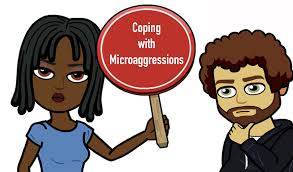Addressing Microaggressions
Dealing with microaggressions can be difficult, but there are several different ways in which you can address them. While we cannot list them all, below are a couple of different approaches to addressing microaggressions.

Approach One
1. Acknowledge
There is no one way or “right” way to react. Work towards becoming aware and accepting of what you are feeling and thinking.
Journaling and other forms of self-reflection can help you gain more insight and awareness into your feelings and reactions.
2. Discuss
Process these experiences with people you trust.
Reaching out to others may protect you from internalizing these negative messages.
They may help normalize and validate your experience.
3. Seek Support
Mental health services
Religious/faith-based services
University and local agencies and organizations
4. Practice Self-Care
Activities that promote a healthy mind, body, and spirit, such as meditation, mindfulness, reading, and prayer.
Activities that help you process your emotions creatively, such as painting, drawing, writing, spoken word, singing, and dancing.
Other activities that can help calm your body and mind, such as exercise, taking a walk, enjoying nature, and cooking.
5. Become Involved
Connect with others by joining an organization or group and/or mentoring others.Engage in activities that make you feel empowered and promote social change.
Write blogs, editorials, and poetry.
Approach Two

Inquire
Have the aggressor further explain their way of thinking. It provides an opportunity to elaborate on specific feelings and realize the implication of their comment.
Impact
Describe how you feel and what you would prefer had happened instead. This allows the aggressor to understand the impact they've had on another person and gives them a strategy for communicating differently in the future.
Reflect
Paraphrase what the aggressor has stated. This enables them to feel like you're listening and gives them a chance to hear the way in which their comment is received.
Reframe
Develop alternative ways to look at and understand a situation. This allows for different perspectives that can bring about more understanding.
Revisit
Discuss a prior microaggression after the fact to show aggressor that prior actions were not well-received and accepted.
[From DEATH BY A THOUSAND PAPER CUTS: Microaggressions and Their Effects on the Learning Climate]


